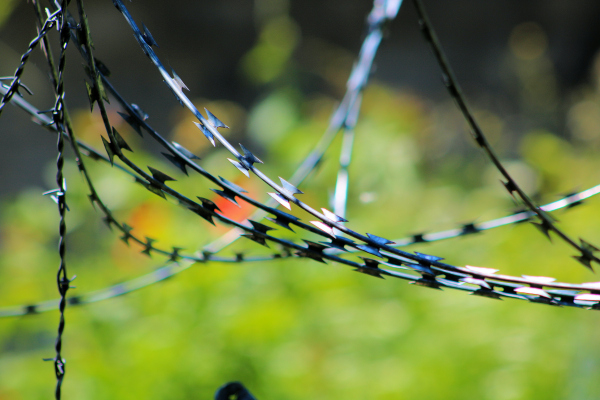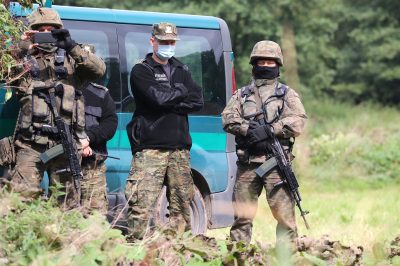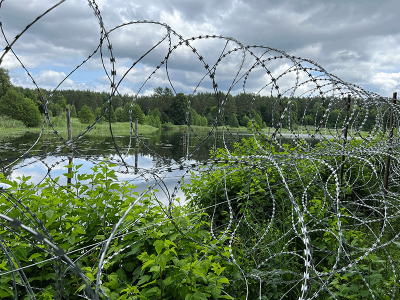
As of August 2021, Poland has experienced a sharp increase in the number of migrants irregularly crossing their external borders from the direction of Belarus. It is a result of the policy implemented by the Belarusian authorities aimed at exerting a political pressure on the EU. Lukashenko’s regime is accused of facilitating arrivals of third country nationals to EU borders and encouraging them to enter the EU in an unauthorised manner.
Since the beginning of August, Polish Border Guard reports daily on multiple groups of migrants, including those from Syria, Afghanistan, Somalia and Iraq, ‘prevented from attempting to irregularly cross the Polish-Belarusian border’. In recent weeks, the situation quickly escalated with deepening the humanitarian crisis, riots on the Polish-Belarussian border, including border check points, and Polish authorities consistent ban on access to the state of emergency zone independent observers and human rights groups.
The humanitarian crisis
The humanitarian crisis on the Poland-Belarus border has deepened significantly since September 2021. According to the official information provided by the Polish authorities eight people have died in the woods due to among other harsh weather conditions and lack of any humanitarian support.[2] However, information gathered from the third-country nationals by the human rights groups acting at the border shows that this number may be higher.
The Polish government persistently refuses the humanitarian groups to access the state of emergency zone. As of September 2021, when the state of emergency was introduced along Poland’s border with Belarus both civil society organizations as well as journalists were denied access to zone. The humanitarian groups such as among other Medics on the Border (Medycy na Granicy), a volunteer group of 40 Polish medical personnel, provided medical aids to migrants in the woods outside the state of emergency. The group applied for permission to enter the state of emergency, yet their requests remained disregarded by the Polish authorities. As of 16 November 2021, the Medics on the Border were replaced by the Polish Medical Mission team who similarly to Medics on the Border provide medical and humanitarian aid outside the state of emergency.
According to Council of Europe Commissioner for Human Rights, Dunja Mijatovic, ‘urgent action is needed to protect the lives of people stranded in the border regions’.
The practice of push backs
With the escalation of the crisis on the border, HFHR and other civil society organizations report on numerous cases of push back of migrants who are captured by the Border Guard in the state of emergency and beyond it. In most cases, migrants are transferred to the border without launching any administrative procedure and despite their repeated requests for asylum in Poland.
HFHR and civil society groups documented the number of cases concerning migrants of vulnerable groups (families travelling with children, persons with disabilities or elderly people) who were pushed back by both Polish and Belarussian Border Guard and who had no access to any legal procedures.
Further legal changes
In August 2021, two amendments of national law have entered into force, affecting the situation at the border. Firstly, the Regulation of 13 August 2021, allowed to place twice as many migrants in guarded centres than before. Secondly, the Regulation of 20 August 2021, introduced provisions according to which persons unauthorized to enter Poland are instructed about the obligation to immediately leave the territory of Poland and are returned to the state border line. The Regulation does not provide exceptions for persons seeking international protection which, according to the Polish Ombudsman, contradicts the Geneva Convention on the Status of Refugees and the Constitution of the Republic of Poland.
Furthermore, on 23 August 2021, the government presented a draft act amending the provisions of the migration law. It provides for a simplified procedure of returning migrants who have crossed the border of Poland in an unauthorized manner. According to it, the foreigner may be obliged to leave the territory of Poland even if they make an application for international protection and without assessing the risk of human rights violation. The removal order is immediately enforceable and appeal against it shall not have a suspensive effect. The proposed provision also allows for leaving their applications for international protection without examination when submitted by migrants apprehended immediately after irregularly crossing the EU’s external border. The amendments, which were criticised by civil society organisations, ODIHR and UNHCR as violating non-refoulement principle. Despite the legal concerns, the law was adopted on 26 October 2021.
Additionally, in September 2021, the government introduced the state of emergency along the entire Poland-Belarus border. The regulation on the state of emergency introduced among others a ban for civil society groups and journalists to enter the zone. The regulation on the state of emergency was prolonged once and according to the law it should expire on 30 November 2021. However, currently, the Parliament works on the draft legislation that would introduce further restrictions even after the expiry of the state of emergency. The new amendments would introduce further restrictions on the freedom of movement, freedom of speech and works of the human rights groups in the area along the border.
Closing space for civil society, first responders and journalists
Since the outbreak of the crisis in August 2021, the Polish authorities have not undertaken any steps towards providing humanitarian or legal aid to foreigners crossing the border. The system of humanitarian aid response was developed organically by the local communities, civil society organizations and their volunteers. In recent weeks, however, HFHR and the group of civil society organizations have received information on the cases of intimidation and legal harassment of the people providing humanitarian aid by the law enforcement officials. In November 2021, the UN Special Rapporteur on Human Rights Defenders, whose representative spent a week on the Polish-Belarusian border, expressed concern about the situation of human rights defenders involved in providing aid.
The human rights groups reported on cases in which the Border Guard officers entered hospitals demanding access to the migrants who were receiving medical aid. According to the groups, the migrants were collected by the Border Guard directly from the hospitals and most probably sent to the border without starting any legal procedure.[10] Furthermore, in October and November, the media reported on several cases of criminal charges pressed against civil society activists providing aid to migrants irregularly crossing the border.
Finally, HFHR observes with great concern the legal and policy restriction for journalists covering the situation at the border. In November the media reported on cases of for example foreign journalists who either stopped in the state of emergency zone and were swiftly tried and fined by the court. The media also reported on cases of three journalists who were outside the state of emergency yet still were stopped by several soldiers who violently pulled them out of the car and handcuffed them. While they remained in handcuffs, soldiers searched the car and accessed their memory cards despite being informed that they may have contained materials subject to the protection of journalistic sources. Upon the arrival of the police at the site, the journalists were released.


